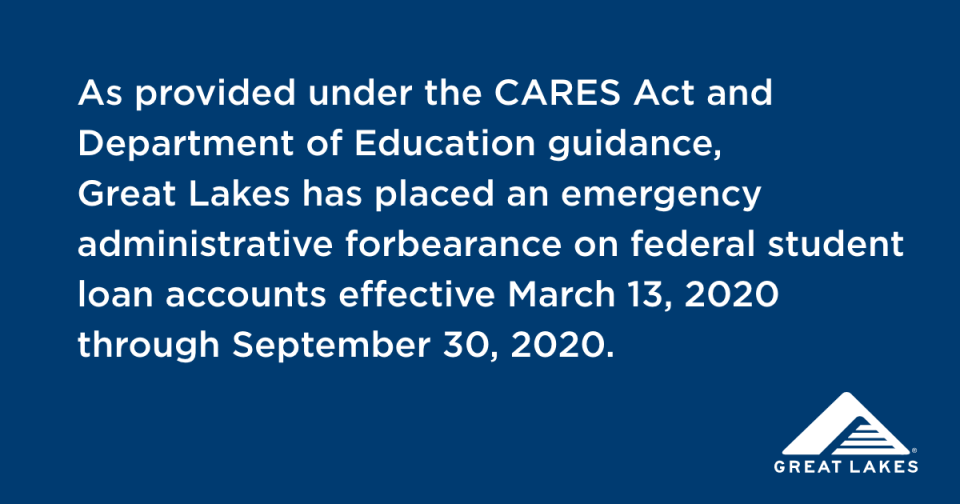Student borrowers sue over ‘illegally damaged’ credit scores amid coronavirus pandemic
This story has been updated to reflect comments from Nelnet.
Consumer advocates are suing federal student loan servicer Great Lakes and three credit reporting agencies over failure to stop reporting borrowers’ credit despite the federal government announcing that it would suspend credit reporting.
“During a national pandemic, these companies illegally damaged the credit of millions of people," SBPC Executive Director Seth Frotman said in a statement. “For too long, the student loan system has crushed borrowers when they slip up, while the industry has received a free pass when it harms millions. Borrowers deserve justice.”
The class action suit was filed on Wednesday evening by the nonprofit law firm Towards Justice as well as the firm Berger Montague, with support from the Student Borrower Protection Center, against Great Lakes (NNI), Equifax (EFX), TransUnion (TRU), Experian (EXPN.L), and agencies owned by VantageScore Solutions in the U.S. District Court’s Northern District of California.
The suit accuses the companies of “inaccurately reporting information about student loan payments that were suspended under the CARES Act.” Consequently, “Plaintiffs and other Class members will suffer long lasting credit stigma, including inaccurate and lower credit scores resulting in no, limited or more costly access to credit.”

As of 2017, when student loan giant Nelnet bought Great Lakes, the servicer handled nearly $240 billion in student loans for more than 8 million borrowers and is now responsible for roughly 14% of student loans originated in the 2018-2019 school year.
Great Lakes provided incorrect credit information to credit bureaus for around 4.8 million federal student loan borrowers, according to Politico.
“These companies have admitted they made a mistake harming millions of student loan borrowers,” Towards Justice Director David Seligman said in a statement. “They say they’ll fix it soon, but for many the damage has been done.”
Both the Education Department (ED) and Great Lakes stated that they were fixing the problem.
“Providing incorrect information to credit reporting bureaus is totally unacceptable, but it’s important to understand Great Lakes quickly corrected the coding issue last Friday and sent updated credit reporting files to ensure as little impact as possible from the coding error,” ED spokesperson Angela Morabito told Politico.
Seligman stressed that “large financial institutions like the defendants here rarely allow borrowers the kind of lenience they seem to be expecting from the American public now.”
Allegedly ‘mishandled the implementation of this relief’
The CARES Act, which was passed in March, had specifically suspended payments and interest, and stopped debt collection on federally-held student loans from March 13 to September 30.
Student loan accounts were placed into forbearance automatically, and billing was suspended. Those actions were not meant to hurt borrowers’ credit scores.
But Great Lakes allegedly “mishandled the implementation of this relief,” the lawsuit argued, “by illegally providing inaccurate information about millions of it is customers to Equifax, TransUnion, and Experian.”
The credit reporting agencies then “illegally reported this information to third parties,” the lawsuit continued, and “each of these companies, in their capacities as the joint owners of VantageScore Solutions, LLC … treated this inaccurate information as derogatory and sold borrowers’ improperly damaged credit scores to third parties.”
The lawsuit demanded that Great Lakes and the credit reporting agencies stop misreporting the payments.

Great Lakes recently told borrowers that the misreporting was due to a coding issue and that the company would correct credit reports retroactively for April.
In an email to Yahoo Finance, Nelnet spokesperson Ben Kiser said that the company apologized for the inconvenience caused by the situation and said it was resolving the issue quickly.
Kiser also explained the timeline:
On May 6, Great Lakes reported payments in a manner it thought would not have an adverse impact on borrowers’ credit scores.
On May 11, it realized that there was something wrong with that process, as it was getting questions from borrowers’ about their credit scores, which they learnt through information from third-party credit services. (That explains this exchange between Federal Student Aid and Credit Karma.)
Great Lakes then “began researching these borrower accounts and determined there was an inconsistency between Great Lakes reporting and that of other student loan servicers,” Kiser said.
“Instead of reporting borrowers as current with monthly payments of $0, Great Lakes reported borrowers as current with deferred monthly payments of $0,” he explained. “That same day, Great Lakes acknowledged the inconsistent coding and let our borrowers know we would adjust the inconsistency in reporting with the credit reporting agencies immediately.”
The company said it had also provided an updated credit file on May 15, and three out of four credit reporting agencies have processed the file, the the fourth to do so imminently.
“Our priority is providing an exceptional customer experience,” Kiser said. “When we fall short of our goal, our focus is to communicate openly and resolve the issue as soon as possible.”
Advocates had previously stated that the fix wasn’t going to be enough.
“Congress cared enough to change the law and spend billions of dollars,” Berger Montague Attorney E. Michelle Drake stated. “Defendants should have cared enough to change a couple lines of computer code.”
CARES Act runs into implementation problems
Over the past few weeks, student loan borrowers had taken to Twitter when they noticed that Great Lakes had dinged their credit despite being on penalty-free forbearance.
Y’all I checked my credit score today and was SHOCKED to see it dropped over 50 (almost 60 points) because my student loan servicer told me my loan payment wasn’t due until September 1. 10/10 do NOT recommend My Great Lakes.
— am. (@amberbraves) May 10, 2020
It’s absolutely irresponsible that Great Lakes(@MyGreatLakes) my student loan provider knocked my credit score 20 points because they reported the 4 month forebearance period to the Credit Bureaus. This is in direct violation of the C.A.R.E.S act section 3513(d).
— Izzak Mireles (@izzak_mireles) May 13, 2020
I’m pissed! I didn’t ask Great Lakes to change my student loans to deferment but they did and it made my credit score drop (even though everything I’m reading says that deferment won’t effect credit scores).
— BFH🏁 (@_HEEZY_) May 10, 2020
This isn’t the first time the implementation of the CARES Act has fallen apart.
Earlier this month, consumer advocates sued Education Secretary Betsy DeVos for her department’s failure to stop garnishing borrowers’ wages despite declaring that it would suspend wage garnishment.
It turned out that even though the department had told employers to stop garnishing employees’ wages to recoup the debt they owed on their federal student loans, the employers did not stop.
On Wednesday, House Education and Labor Committee Chairman Bobby Scott sent a letter to DeVos, demanding an explanation for why the department wasn’t able to stop that process effectively.
—
Aarthi is a reporter for Yahoo Finance covering consumer finance and education.
Read more:
'It's too good’: How for-profit colleges entice and hinder Americans
U.S. student loan interest rates plummet amid coronavirus downturn
Read the latest financial and business news from Yahoo Finance
Follow Yahoo Finance on Twitter, Facebook, Instagram, Flipboard, SmartNews, LinkedIn,YouTube, and reddit.


